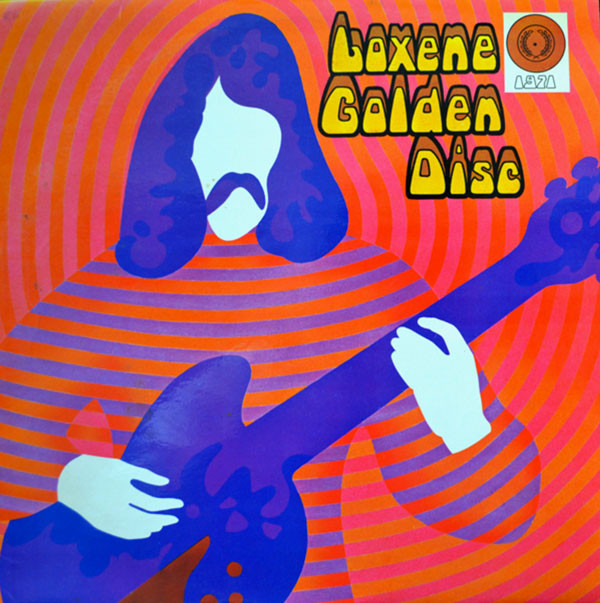
The 1971 Loxene Golden Disc album.
It’s hard to conceive now, but there was a time when the most powerful force in New Zealand popular music was a competition held annually by a British shampoo company. More important than radio, more powerful than the press and a primary reason why we have a reasonable number (although many are missing) of film clips of sixties stars like Shane, Ray Columbus and many more, the Loxene Golden Disc was held annually from 1965 to 1972 and was the preeminent event in the New Zealand pop calendar.
The Loxene Golden Disc was conceived by a young New Plymouth broadcaster, Edd Morris, after he returned from a year in Australia where he saw how various awards shows were working there. Morris talked with his boss at 2ZP, who sent the idea to Wellington.
Independently both the record industry and the NZBC were considering award show ideas but were unsure as to how to proceed. The NZBC was limited by the commercial constraints in its charter, which prevented it bankrolling such an obviously commercial event, and the recording industry was limited by the lack of available funds.
The state broadcaster’s head office requested that the local station expand the idea into a full proposal and this was then presented to Neville Chamberlain, a popular radio DJ known as Cham the Man. Chamberlain liked the idea and took it to the Charles Haines advertising agency, with whom he had a close relationship. The agency, in turn, pitched it to Loxene shampoo manufacturer Reckitt & Colman who agreed to come on board as the naming sponsor. In return for naming rights, Reckitt & Colman would fully fund the award, the broadcast of the show and all publicity surrounding the event.
The recording industry body, the New Zealand Federation of the Phonographic Industry (NZFPI), formulated entry and judging criteria, reducing Morris’ plan for multiple awards to a single Loxene Golden Disc.
Reckitt & Coleman’s David Forsythe, Chairman of the Golden Disc Committee, told Thursday magazine in 1971, “the contest was essentially a public relations promotion for Loxene.”
The stated aim was “to foster New Zealand recording artists and create public awareness of the quality of New Zealand talent in the popular music field.”
Around the same time, APRA’s forward-thinking Patricia Bell had been pushing through a national songwriting award and, after some discussion, it was agreed the same show would host their new Silver Scroll songwriting award.
For the record industry, it came at a fortuitous time. New Zealand's pop industry was about to explode with local giant HMV funding upgraded Wellington recording facilities, hiring in-house producers and signing acts; and a raft of smaller indies – including Eldred Stebbing’s Zodiac, and Murdoch Riley and Ron Dalton’s Viking – were already thriving. New Zealand labels had begun to score offshore hits, most notably in Australia where Ray Columbus and The Invaders had just snared a No.1 hit with ‘She’s A Mod’.
In New Zealand, the tsunami generated by The Beatles’ mid-64 visit had filled the clubs with many dozens of beat bands, and The Rolling Stones, The Who, The Pretty Things and others were about to add another layer to the frenzy.
The concept was simple: the labels would submit singles for consideration by a panel of judges who were instructed to “choose the best according to selection of material, presentation, artistic technique and overall appeal”. In 1965, from the 44 songs on offer they chose 10, which were then voted on by the public on forms distributed via chemist stores and hairdressers.
The winner would receive £250 and a Golden Disc.
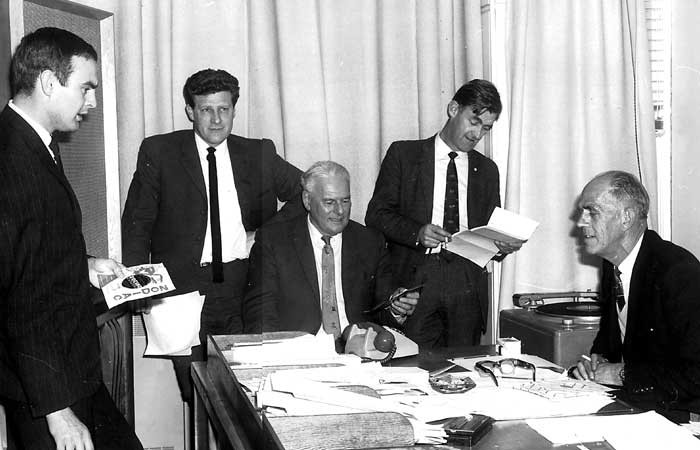
The 1965 Loxene Golden Disc judges: John Lash (from Charles Haines Advertising), Neville Chamberlain, Arthur Pearce (broadcaster), John Monaghan (New Zealand's Billboard magazine columnist) and A.R.G. (Bob) Bothamley (NZBC programmer) - Simon Grigg collection
1965
Despite early initial discussions to create a live TV show, the first two Loxene Golden Discs were a radio only live-affair, with the 1965 finalists being broadcast live from the Wellington White Heron on 25 November, after an earlier dinner. There was, however, a pre-recorded show created at WNTV-2 in Wellington by director Christopher Bourn. It featured the finalists performing live (in the studio) versions of their songs, a New Zealand first as all earlier NZBC music shows were mimed.
They were:
Dinah Lee – ‘I’ll Forgive You Then Forget You’ (Viking)
Herma Keil – ‘Teardrops’ (Viking)
The Yeomen – ‘Love Is A Very Funny Thing’ (HMV)
Tony and the Initials – ‘Leah’ (Viking)
The Chicks – ‘Hucklebuck’ (Viking)
Ray Columbus and The Invaders – ‘Till We Kissed’ (Zodiac)
Tommy Adderley – ‘Like Dreamers Do’ (RCA)
Paul Walden – ‘No Moa!’ (HMV)
Bruno Lawrence – ‘Bruno Do That Thing’ (HMV)
The Minors – ‘You’re Not There’ (HMV)
That Ray Columbus and The Invaders were awarded the very first Golden Disc for their classic ballad surprised few on the night and Ray was quoted as saying, “I’m very pleased.” His name would appear in the finals many more times over the next eight years.
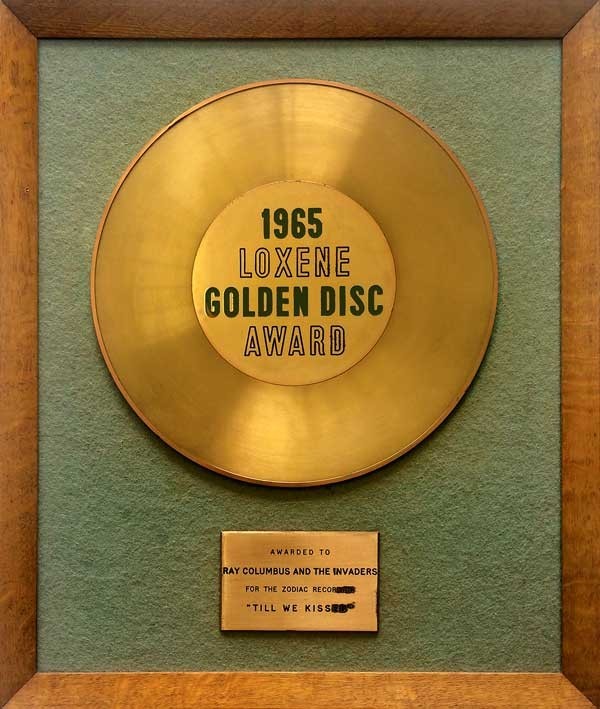
The very first Loxene Golden Disc - Courtesy of Billy Kristian and Ray Columbus & The Invaders
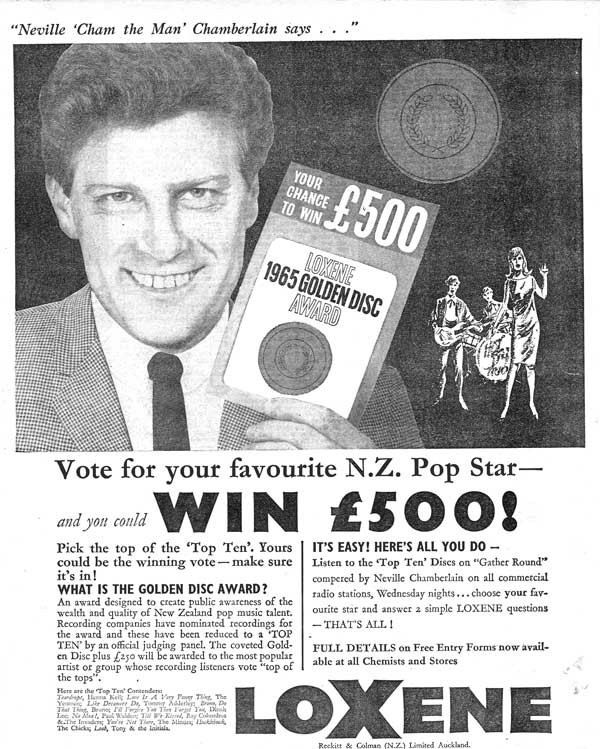
Oddly, the winner of this competition to guess the winner of the 1965 Loxene Golden Disc received twice as much as the winning act
Zodiac were also presented a disc and a Dorothy Betteridge of Wellington also won £500, strangely twice the amount paid to Ray and group, for correctly picking the winner (plus answering two questions). The evening's host was Neville Chamberlain.
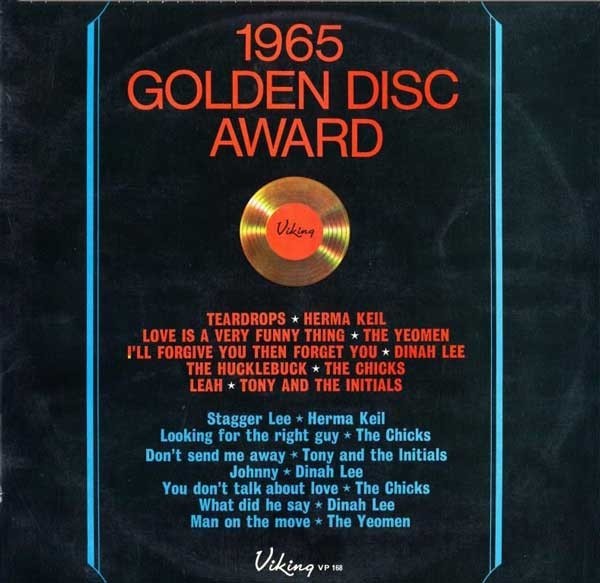
The 1965 Viking Golden Disc Award album. The compilation gathered together Viking related finalists and their B-sides and was not an official *Loxene* related product. That would come a few years later.
Viking Records issued a Golden Disc album (they would do so again in 1966, but both included only their own entries, including B-sides) and the whole thing was deemed to be a roaring success for all concerned.

Ray Columbus with the Loxene Golden Disc for 'Till We Kissed' (performed with The Invaders), November 1965. - Simon Grigg collection
And so it was, for the 1965 Loxene Golden Discs effectively kicked off a golden age for New Zealand pop. There had been massive local hits prior to the awards of course, but for the next eight years – or at least until the disc awards began to lose favour with the stakeholders, the media and the public in the early 1970s – the machinery of pop music took hold, each year centred around the simple gold platter and the extended build-up to it.
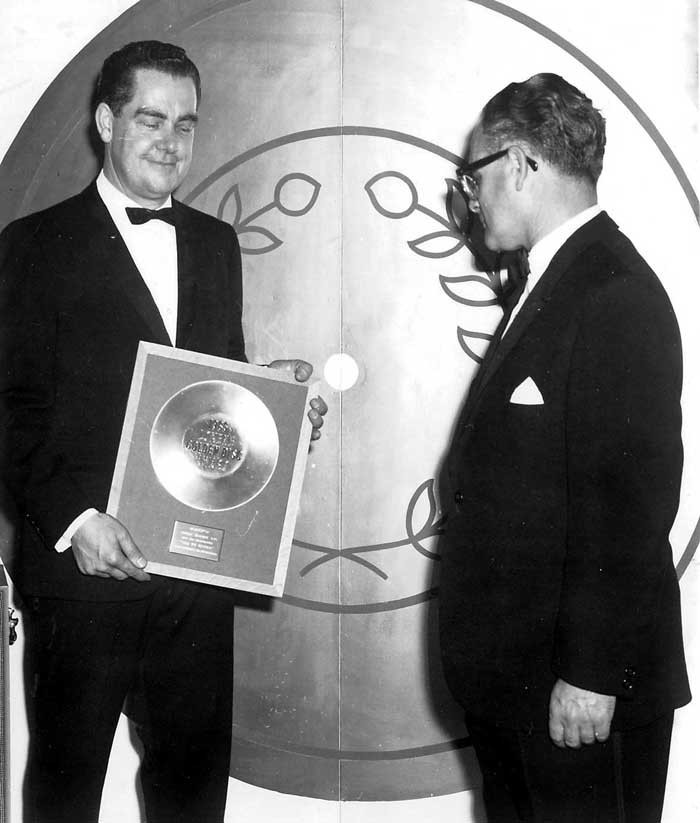
Zodiac's Eldred Stebbing and Allied International's Fred Noad, on behalf of the New Zealand Federation of the Phonographic Industry with the 1965 Loxene Golden Disc. The Loxene Golden Disc was awarded both to the artist and the record company. Sadly over the years all the record company discs seem to have disappeared, including this one. - Simon Grigg collection
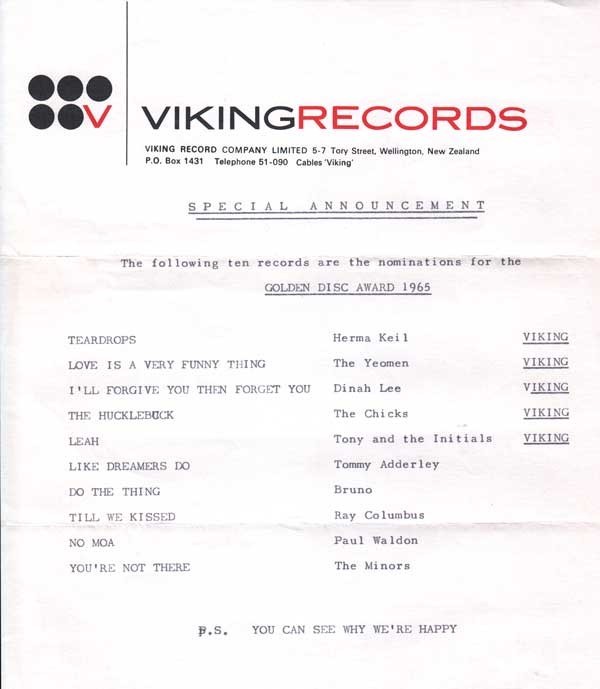
Viking were happy ... - Keith Richardson collection
1966
The 1966 Loxene Golden Disc was once again in Wellington, and again at The White Heron Lodge, on 9 November. The winner was a young singer from the Waikato, Maria Dallas, with her smash hit ‘Tumblin’ Down’, released by Viking and written by Jae Epae who was also a finalist with ‘Hold On Tight’.
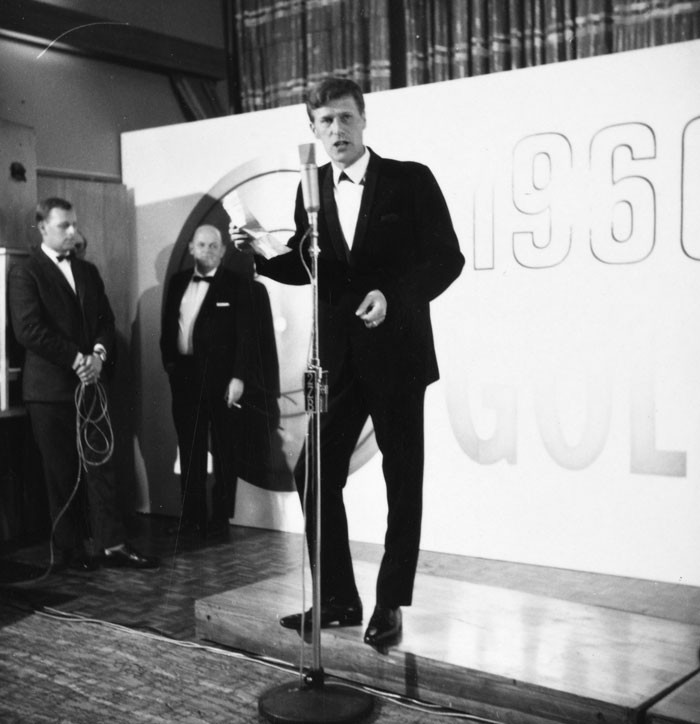
Neville Chamberlain at the 1966 Loxene Golden Disc Awards - Photo by Barry Clothier, Alexander Turnbull Library
The finalists were:
Maria Dallas – ‘Tumblin’ Down’ (Viking)
Jay Epae – ‘Hold On Tight’ (Viking)
Howard Morrison – ‘Don’t Let It Get You’ (HMV)
Ray Columbus – ‘I Need You’ (Impact)
The Gremlins – ‘The Coming Generation’ (Zodiac)
The La De Da’s – ‘How Is The Air Up There’ (Philips/Zodiac)
The Yeomen – ‘Love Is A Very Funny Thing’ (Viking)
John Hore – ‘My Heart Skipped A Beat’ (Joe Brown)
Gwynne Owen – ‘In My Room’ (HMV)
Ken Lemon – ‘Living In A House Full Of Love’ (Viking)
As per 1965, the whole show was broadcast live on MC Neville Chamberlain's Gather Round networked programme, but this time the finalists were broadcast on the four TV stations the following evening, in an hour hosted by Erin Sinclair and produced again by Chris Bourn. As Chamberlain told the NZ Listener, "At some stage during the year, nearly every artist will have talked over with his or her record company the chance of winning the contest. It has considerable prestige and means a lot to the public."
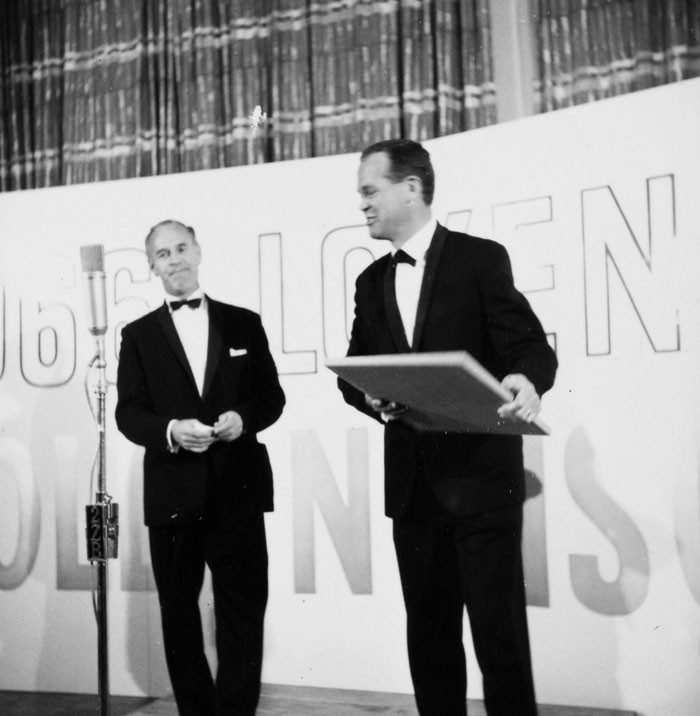
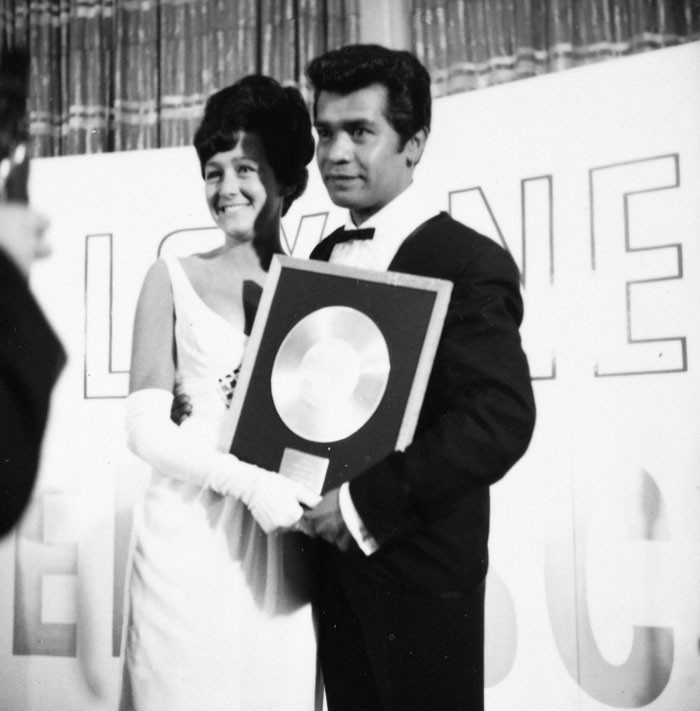
Maria Dallas and Jay Epae at Wellington's White Heron Lodge - Photo by Barry Clothier, Alexander Turnbull Library
1967
The awards in 1967, held for a third (and final) time in the White Heron Lodge in Kilbirnie, Wellington (on 4 November – the venue is now The Brentwood Lodge) saw a change in the voting. Whilst the judging panel – this year Peter Downes of the NZBC, Roger MacDonnell of Charles Haines, John Monaghan, the NZ Billboard magazine columnist, and two independent judges, Barry Duncan and a 20-year-old Tony Backhouse, later of The Crocodiles – still selected the final 10 from the 48 entries, public voting was now done via a form in the back pages of the NZBC magazine, NZ Listener, or on a form acquired at radio stations. This was at the insistence of Charles Haines, who wanted to see a wider voting franchise.
A lucky voter won a return trip to Wellington to see the show.
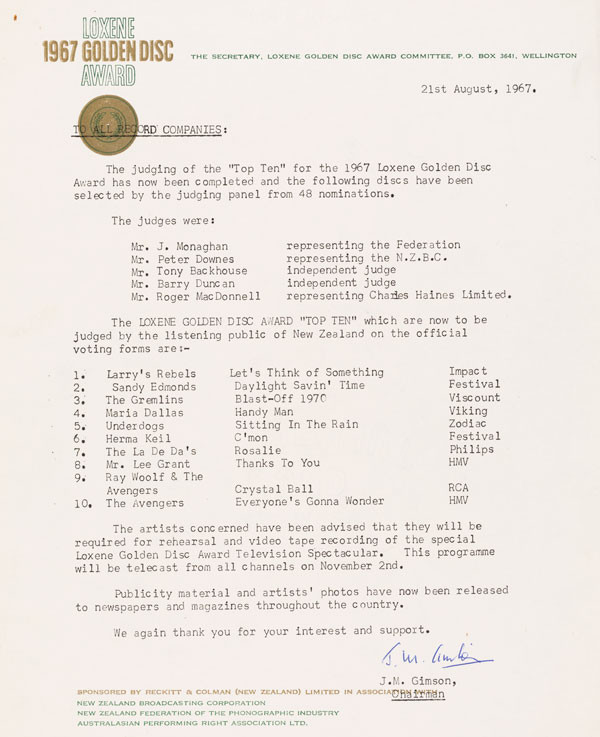
The letter to the record companies informing them of the 1967 Top Ten - David Brown collection, Alexander Turnbull Library
The top 10 in 1967 was
Herma Keil – ‘C’mon’ (Festival/James Productions)
The Gremlins – ‘Blast Off 1970’ (Zodiac)
The La De Da’s – ‘Rosalie’ (Philips/Zodiac)
Sandy Edmonds – ‘Daylight Saving Time’ (Festival/James Productions)
Larry’s Rebels – ‘Let’s Think Of Something’ (Impact)
The Avengers – ‘Everyone’s Gonna Wonder’ (HMV)
The Underdogs – ‘Sitting In The Rain’ (Zodiac)
Maria Dallas – ‘Handy Man’ (Viking)
Mr. Lee Grant – ‘Thanks To You’ (HMV)
Ray Woolf And The Avengers – ‘Crystal Ball’ (RCA)
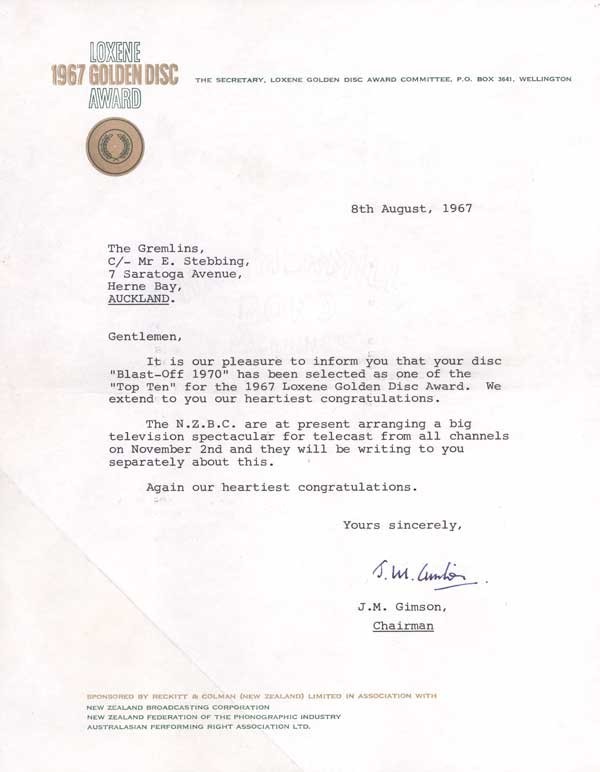
The Gremlins are informed that they are in the finals of the 1967 Golden Disc - Glyn Tucker collection
However, as with 1965, the result was a foregone conclusion, so much so that only The Avengers were in the Opera House to see Mr. Lee Grant – he who could possibly out-teen-frenzy The Beatles at the time – win the 1967 Loxene Golden Disc with the mega-smash ‘Thanks To You’.
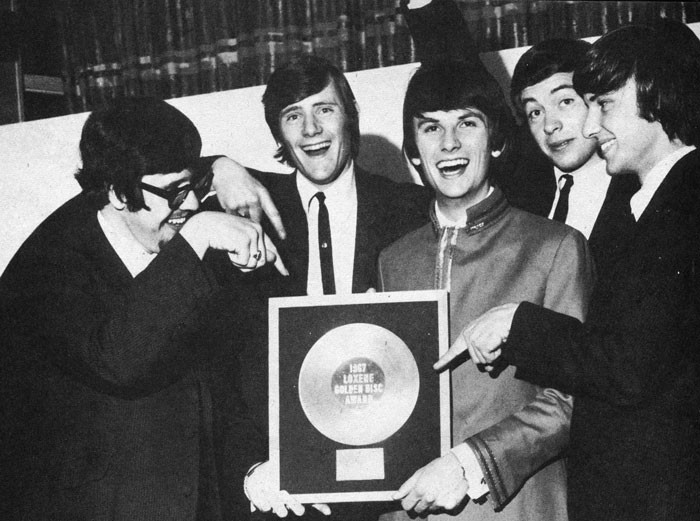
Mr. Lee Grant with his 1967 Golden Disc, surrounded by runners-up The Avengers. The black and white image doesn't do justice to Mr. Lee's scarlet tunic. His acceptance was "I owe this award to all who voted for me – it's thanks to you." - Photo by Barry Clothier. Simon Grigg collection
It was the beginning of an HMV monopoly of the award. Indeed, for five years no other label was able to wrest the plaque from the nation’s biggest record company and their string of hit acts and ace pop producers.

By 1967 the winner of the competition to guess the Top Ten had a much more frugal prize
1967 also saw another Loxene Golden Disc TV show, this time broadcast two days before the ceremony. Again fully funded by Reckitt & Coleman and directed by Chris Bourn, it saw the broadcaster and shampoo company commissioning standalone video clips of the final top 10 using NZBC crews. It is the reason we have clips from the likes of The Underdogs and Sandy Edmonds.
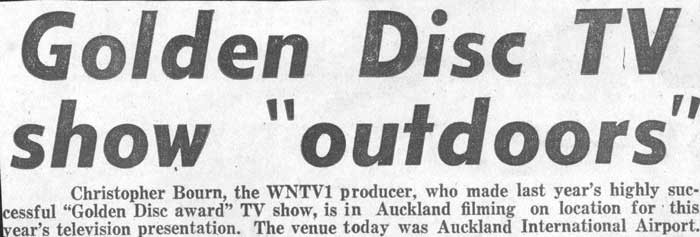
Producer and director Christopher Bourn broke new ground when he filmed the bands outside the studios for the Loxene shows
For the NZBC it was a win-win situation – a growing audience of young people attracted by videos they could bill back to Reckitt & Coleman, who covered all costs. These clips were shown by the four local stations repeatedly over the next few years.
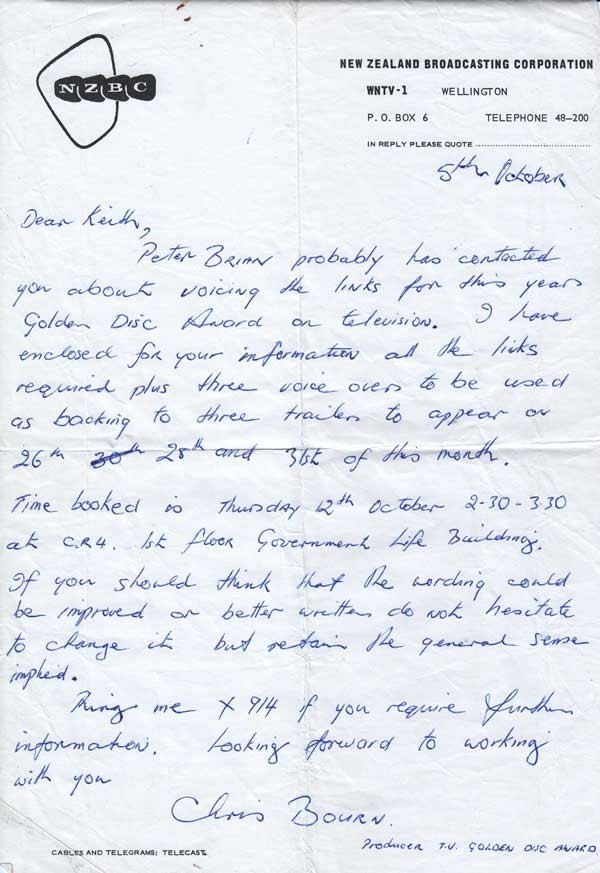
The NZBC's Christopher Bourn asks Keith Richardson if he will voice the 1967 awards - Keith Richardson collection
The prize money, as we were now using decimal currency, was $500.
Phil Warren, working with venue owner Kerridge Odeon, took Mr. Lee Grant, The Gremlins, Ray Woolf, Larry’s Rebels, Herma Keil, The Avengers and Sandy Edmonds out on the road, selling out venues nationwide. A large amount of money was made, but probably not by the acts.
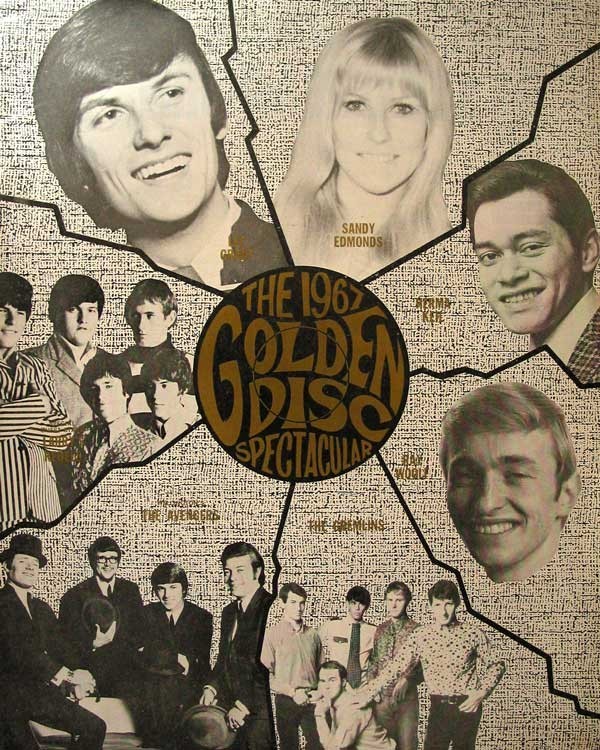
The programme for the 1967 tour
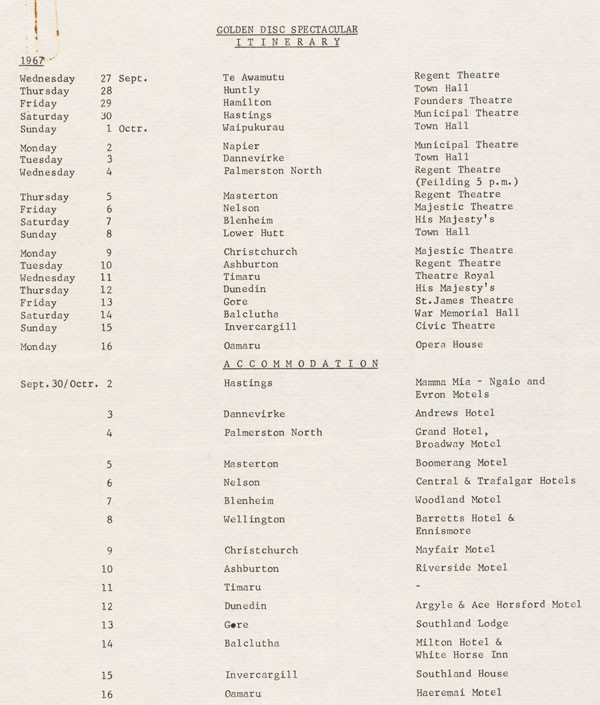
"I've been everywhere, man ..."
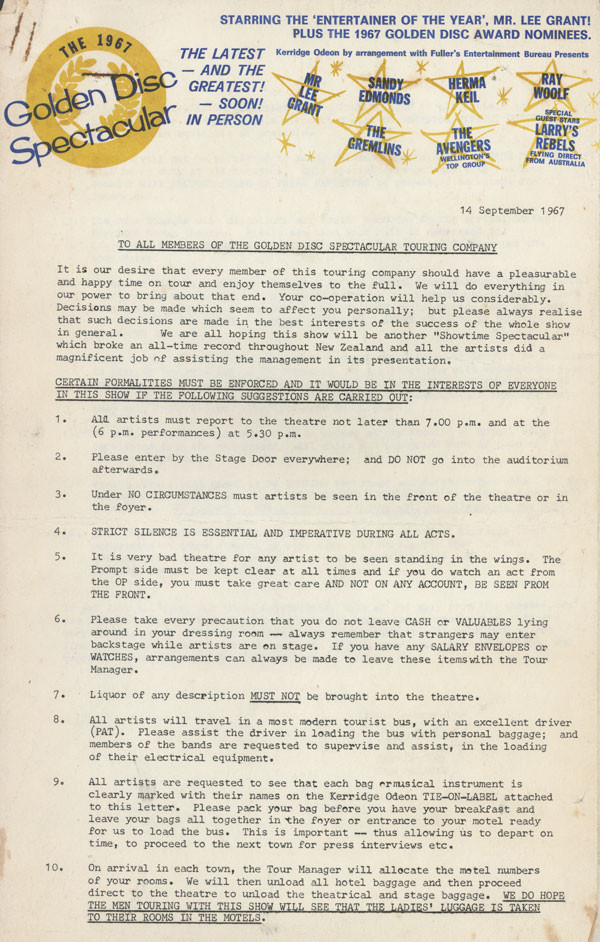
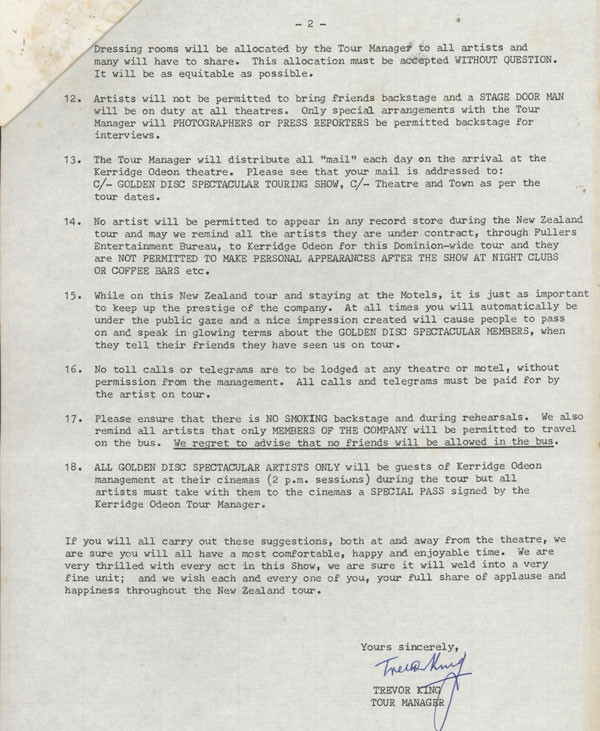
The 1967 Loxene Golden Disc band instructions. The tours were promoted by Phil Warren's Fuller's Entertainment Bureau in partnership with Kerridge Odeon, who owned the theatres. - Glyn Tucker collection

The spectacular hits Northland
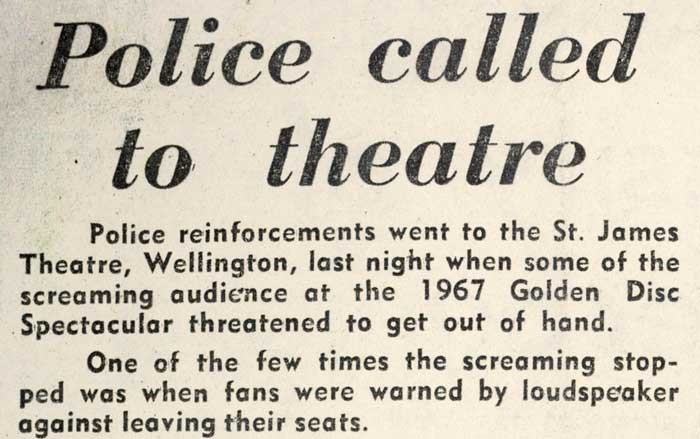
Mayhem and frenzy in Wellington
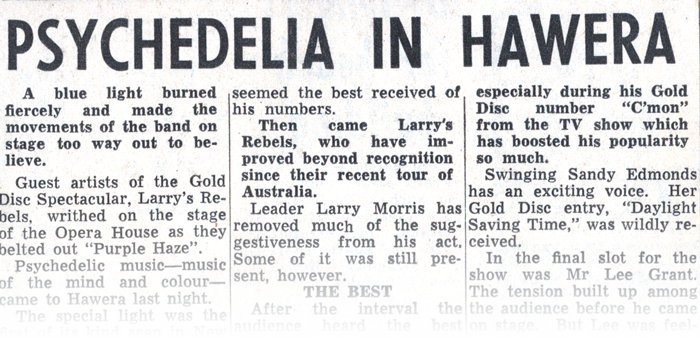
And worse in Hawera ...
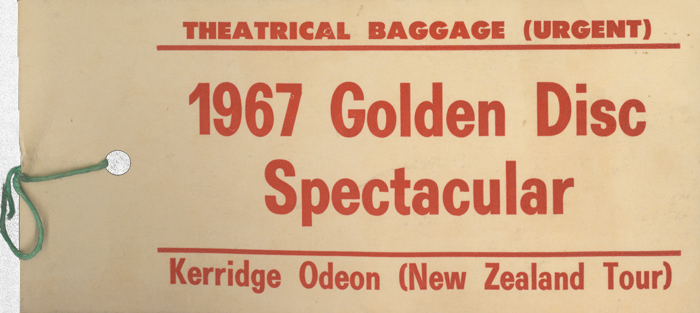
1968
The winner of the 1968 Loxene Golden Disc, this time held in Auckland on 7 November at Auckland’s Intercontinental Hotel, was Allison Durbin, and again, as the NZ Listener said, “was almost a foregone conclusion”. Indeed, ‘I Have Loved Me A Man’ would to go on to become the biggest selling New Zealand single of all time and remains a local radio gold staple almost five decades on.
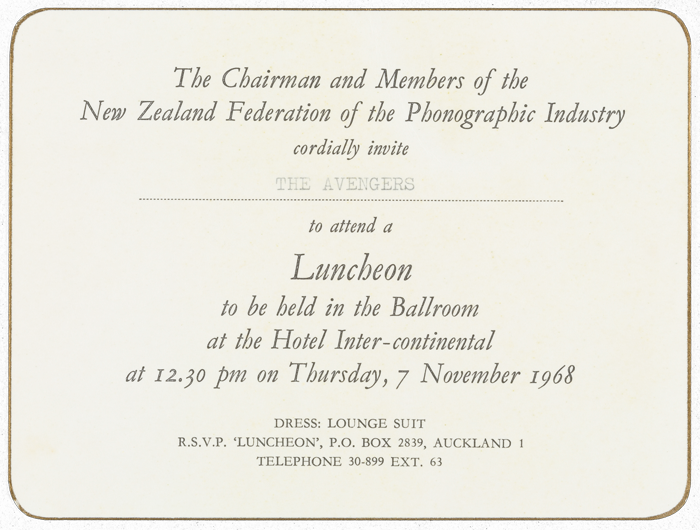
The NZ Listener also noted that the industry showed a visible “sigh of relief” when the result was announced, concerned that the fickle voting public may have upset the required result.
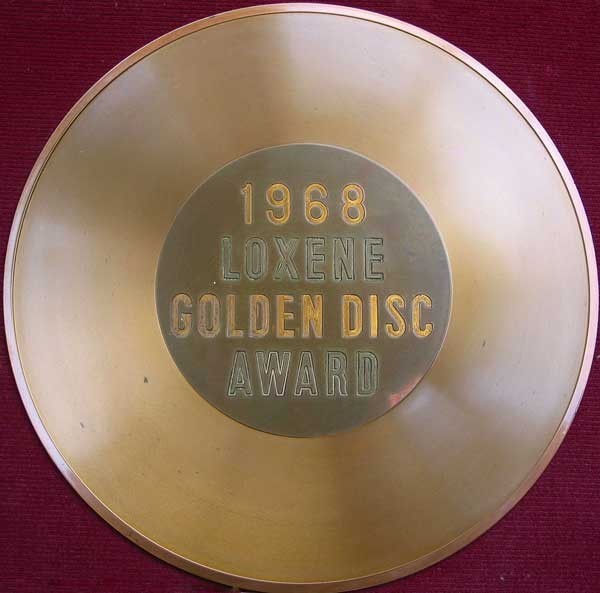
Allison Durbin's 1968 Golden Disc
1968 also saw the addition of Cover of The Year but there seems to be no record as to who won this, either this year or in any following.
For the first time the judges – the selectors of the final 10 – were all radio people: Peter Sinclair, Paddy O’Donnell, Arch King, Colin Lehmann, John James, Keith Richardson, Brian Tucker and Jim Healey.
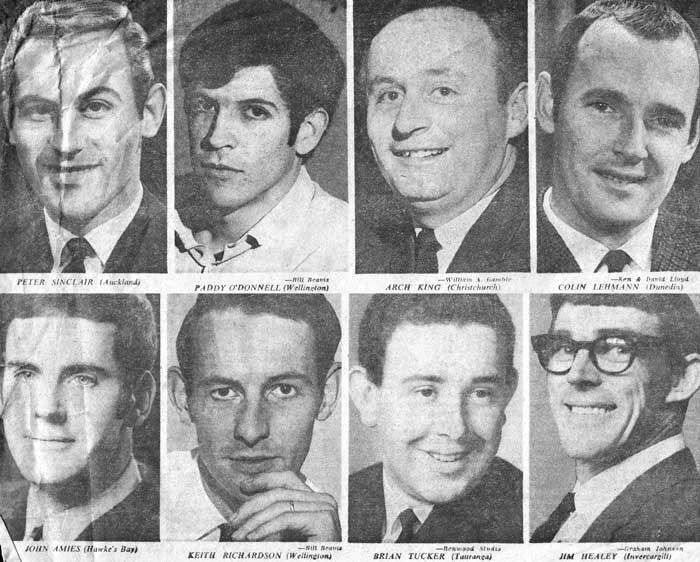
The 1968 judging panel was very much a radio panel
The top 10 was:
Allison Durbin – ‘I Have Loved Me A Man’ (HMV)
The Shevelles – ‘Beat The Clock’ (Philips)
Larry’s Rebels – ‘Halloween’ (Impact)
Ray Columbus – ‘Happy In A Sad Kind Of Way’ (Philips)
The Hi-Revving Tongues – ‘Tropic Of Capricorn’ (Zodiac)
The Avengers – ‘Love Hate Revenge’ (HMV)
The Simple Image – ‘Spinning Spinning Spinning’ (HMV)
The Fourmyula – ‘Alice Is There’ (HMV)
The Chicks – ‘River Deep-Mountain High’ (Festival/James Productions)
Mr. Lee Grant – ‘Why Or Where Or When’ (HMV)
Pamela Alphors from Hamilton won the public voting competition. Her prize included a trip to Auckland, dinner with NZBC celebrities and a “gift” from Reckitt & Coleman. 35,585 New Zealanders mailed in the form but 213 were deemed invalid.
It was the first live networked TV ceremony, filmed by Auckland’s AKTV2 and simulcast on NZBC radio stations.
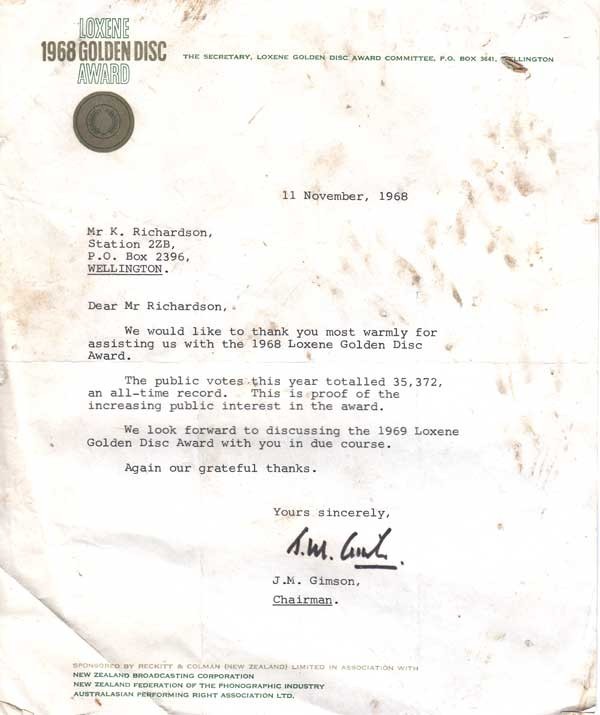
The committee thanks Keith Richardson for his support - Keith Richardson collection
Adding a bizarre twist, one of the singers in The Shevelles was pregnant and overdue. Her waters broke on stage while they were performing the song at the Auckland ceremony. She then got on the plane to Wellington, and an ambulance met her at the airport.
1969
In its fifth year the awards, held in Auckland’s Intercontinental Hotel on 15 October, evolved a little. Whilst there was still one supreme award, there were now two second-tier awards, one for the group and one for a solo artist. In addition, a producer award was added. The selection of the finalists now also moved to a wider panel of nationwide radio stations.
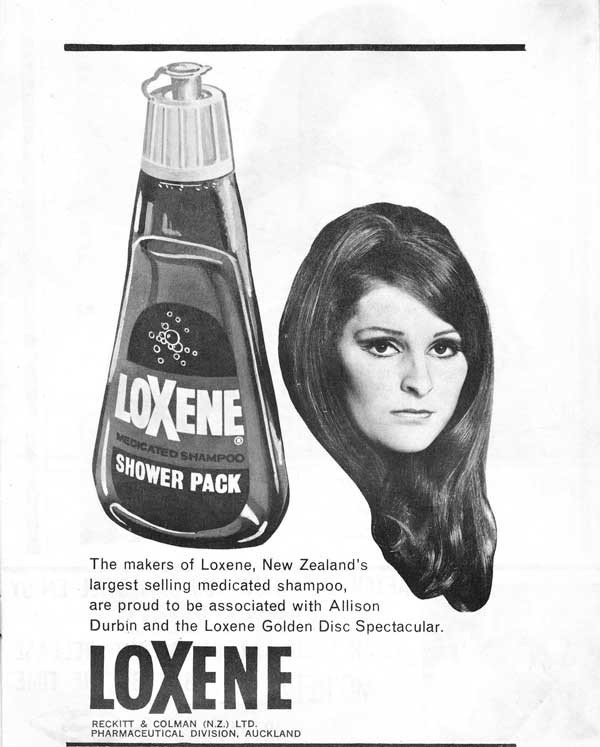
Allison Durbin's ties to Loxene did not end when she won her disc and Loxene's agency must have been thrilled to have a winner with such famed locks
The first recipient of the group award was The Hi-Revving Tongues for the epic ballad ‘Rain And Tears’ (Zodiac). For that, they received $100. The solo award went to Shane for his similarly grand No.1 smash ‘Saint Paul’ (HMV) which also won the 1969 Loxene Golden Disc, for which he pocketed $500 ($100 for the solo award and a now-reduced $400 for the Disc) – or at least he would have, if the cheque hadn’t been intercepted by his management. He told this writer in 2015 that it was eventually paid to him less their 20% commission.
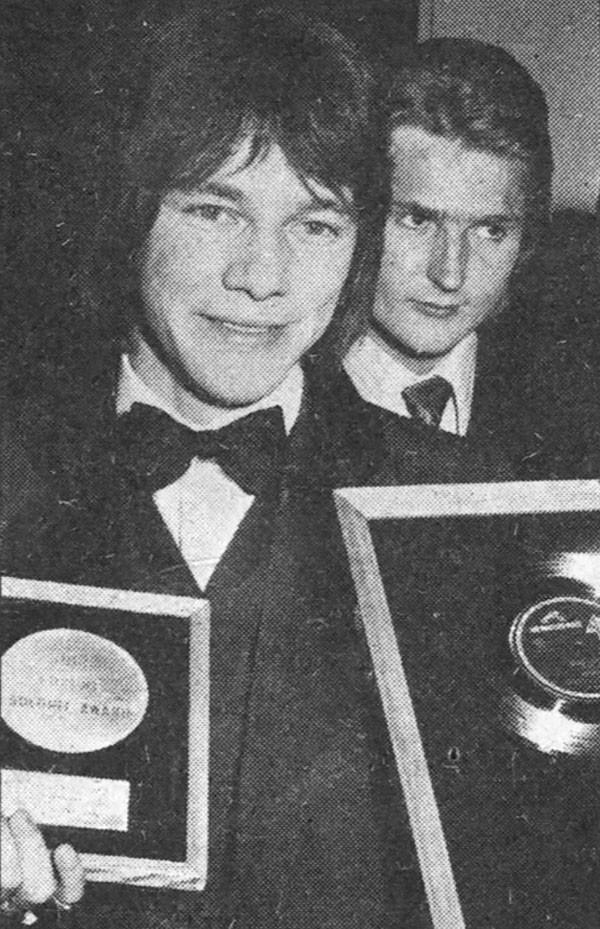
Shane in 1969. Behind him is Chris Parfitt of The Hi-Revving Tongues.
The top 10 were:
The Hi-Revving Tongues – ‘Rain And Tears’ (Zodiac)
Shane – ‘Saint Paul’ (HMV)
Larry Morris – ‘The Hunt’ (Impact)
The Rebels – ‘My Son John’ (Impact)
Dedikation – ‘Wait For Me Mary-Anne’ (Philips)
Mike Durney – ‘Why Can’t I Cry’ (Pye)
The Avengers – ‘Out Of Sight Out Of Mind’ (HMV)
The Chicks – ‘Miss You Baby’ (Philips)
Hamilton County Bluegrass Band – ‘Barefoot Nellie’ (HMV)
The Simple Image – ‘Michael And The Slipper Tree’ (HMV)
The only original composition in the top 10 was from The Avengers, written by Dave Jordan, and was thus automatically awarded an APRA award for the best New Zealand composition in the list.
Given the artwork standard at HMV at the time it would be surprising if it had not gone to the company, and their in-house producer Wayne Senior was deservedly named Producer of The Year for which he received $100.
The TV show drew more viewers than that year’s election results.
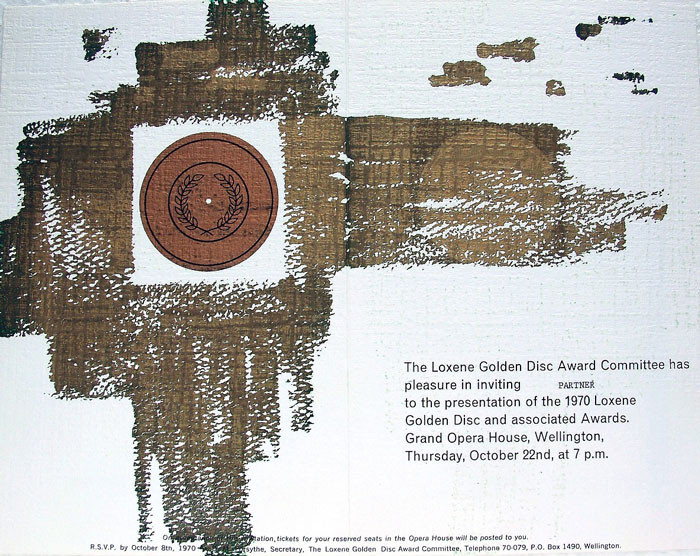
1970
Back in Wellington at the Opera House on 22 October, there was another change to the format. There were now 12 finalists as a result of a series of meetings between the NZFPI and the NZBC who both felt the ceremony needed broadening a little. There was some discussion, too, about abolishing the main award and having just equal group and solo awards but this never eventuated and the supreme award remained. It was too important a sales tool to the industry.
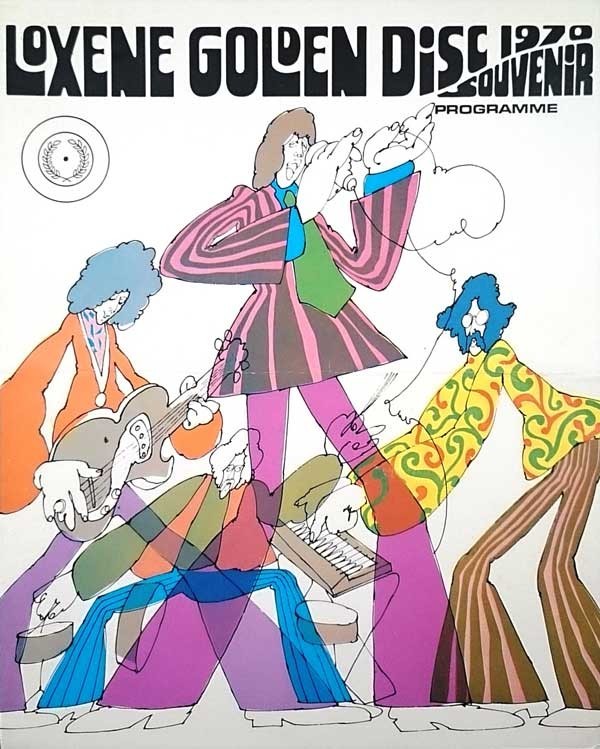
The programme for the 1970 Loxene Golden Disc show - David Brown collection, Alexander Turnbull Library
Peter Dawkins took the producer’s award – hardly surprising since he guided seven of the 12, including all the winners. These were Craig Scott for ‘Let's Get A Little Sentimental’ (solo award and $100), and Hogsnort Rupert's Original Flagon Band, whose ‘Pretty Girl’ (HMV) won the group award ($100) and the supreme Golden Disc ($400).
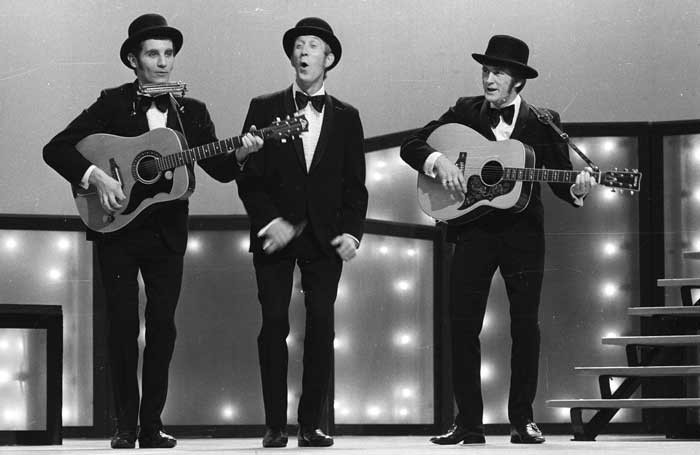
Hogsnort Rupert's Original Flagon Band performing at the 1970 Loxene Golden Disc awards
The award presenters were Johnny Devlin, who also performed, and Max Cryer. The show, as it had been since 1967, was MC-ed by Peter Sinclair.
HMV had nine of the top 12 and a 10th was recorded in their studios. The company also issued the first of what would an annual best-seller, the Loxene Golden Disc album, although it was released on behalf of the NZFPI. Benny Levin’s Impact label was resistant at first to the inclusion of their track as they felt there was more money to be made by selling the single. Impact eventually backed down “under severe protest” when the NZFPI threatened to remove his track from the top 12. It was, he would have discovered, a decent money spinner for all concerned, selling 26,038 copies and generating some $20,000 in royalties. It retailed for $2.99. The artwork for some of the Loxene albums was by Paul Hanrahan, an art director at the Charles Haines agency.
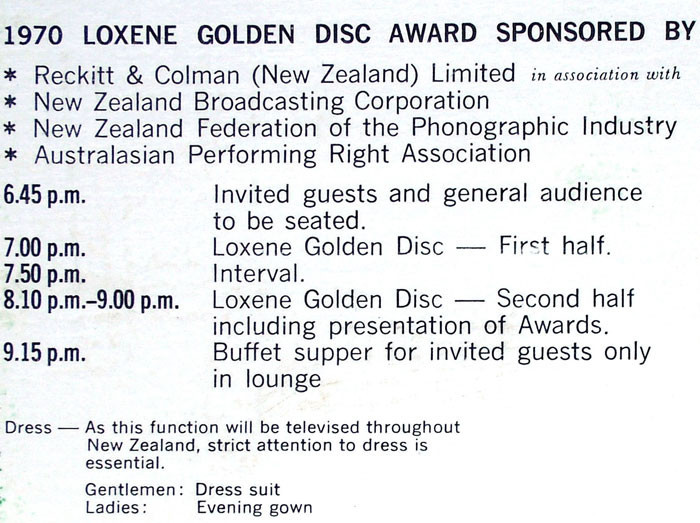
Gentlemen: Dress Suit, and Ladies: Evening Gown. There was a formality about the Loxene Gold Discs that has long since disappeared.
At a board meeting in October 1970 the NZFPI first discussed the idea of breaking away from the Golden Disc and creating their own awards, as both they and the NZBC were uncomfortable with the control demanded by Reckitt & Colman’s agency.
The 12 finalists were, in order of votes received:
Hogsnort Rupert's Original Flagon Band – ‘Pretty Girl’ (HMV)
Craig Scott – ‘Let's Get A Little Sentimental’ (HMV)
David Curtis – ‘Wheel Of Fortune’ (HMV)
Suzanne – ‘Yesterday When I Was Young’ (Philips)
The In-Betweens – ‘Boom-Sha-La-La-Lo’ (Impact)
Hamilton County Bluegrass Band – ‘Carolina On My Mind’ (HMV)
Shane – ‘Natural Man’ (HMV)
The Kal-Q-Lated Risk – ‘I'll Be Home’ (HMV)
The Fourmyula – ‘Nature’ (HMV)
Quincy Conserve – ‘Ride The Rain’ (HMV)
Ray Columbus – ‘Travelling Singing Man’ (Philips)
The Revival – ‘Viva Bobby Joe’ (HMV)
Amongst the entries that did not make the final dozen were recordings by the Canterbury Rugby Club and the Onslow Brass Brand.
1971
As 1971 rolled around the awards were coming in for some wide-ranging criticism. It seemed they could not win. On one hand, the counterculture had well and truly arrived and what was acceptable “pop” in 1965 was often regarded as irrelevant pap by many in 1971, increasingly ignored by a market who wanted quality long-players by artists who wrote their own material. On the other hand, the NZBC was continually pushing towards a more family-friendly show, encouraged by the likes of Studio One. Thursday, a weekly magazine, ran an in-depth four page and somewhat scathing critique of the Loxene Golden Disc a week out from the show, which was held in Palmerston North’s Opera House as part of that city’s centennial on 2 November.
Writer Marie Anticich suggested that “by the time you have trudged off to bed [after the TV broadcast] you will have forgotten it completely.” Although, somewhat curmudgeonly she also opined that its failures included the fact that “none of the six previous winners has achieved any kind of international success.” Hardly a fair bar at the time – and Allison Durbin was quite the star in Australia.
Phil Warren countered this by pointing out that the winner could make $5,000 in a short time from record sales and work – a very healthy sum in 1971.
A perhaps more finessed criticism, and one voiced by many was that the judging system was flawed. 22 radio stations selected the Top 12 from, in 1971, 60 entries, often using whoever was available. This, it was claimed, meant that the finalists were “inexpertly chosen by people who wouldn’t have a clue about pop music” and overly conservative, plus they were subject to the fickleness of whatever was being played heavily on the local stations. David Forsythe, on behalf of the sponsors, was more satisfied with the process. It did, he said, “negate the way-out choices”.
Another unnamed critic suggested the public should be kept out of the judging: “It’s stupid letting them come in and louse up the whole process like that.” Nobody was happy, and the story must have caused quite an industry commotion at the time.
Even less happy were the independent labels, the likes of Benny Levin, Eldred Stebbing (Zodiac) and, most vocally, Ode’s Terence O’Neill-Joyce, who wrote a letter to the NZFPI complaining that small labels simply could not afford to give away several dozen singles to radio stations to be judged. (30 years later, when O'Neill-Joyce was the general manager of RIANZ, the system was that judges had to return their entry copies after judging was over.)
Clearly, something had to give but it would not be for another year.
The winner of the 1971 Loxene Golden Disc was Craig Scott for ‘Smiley’ (plus the solo award) with Chapta’s ‘Say A Prayer’ taking the group award. Both were Peter Dawkins productions as were four other finalists. Guess who won Producer Of The Year …
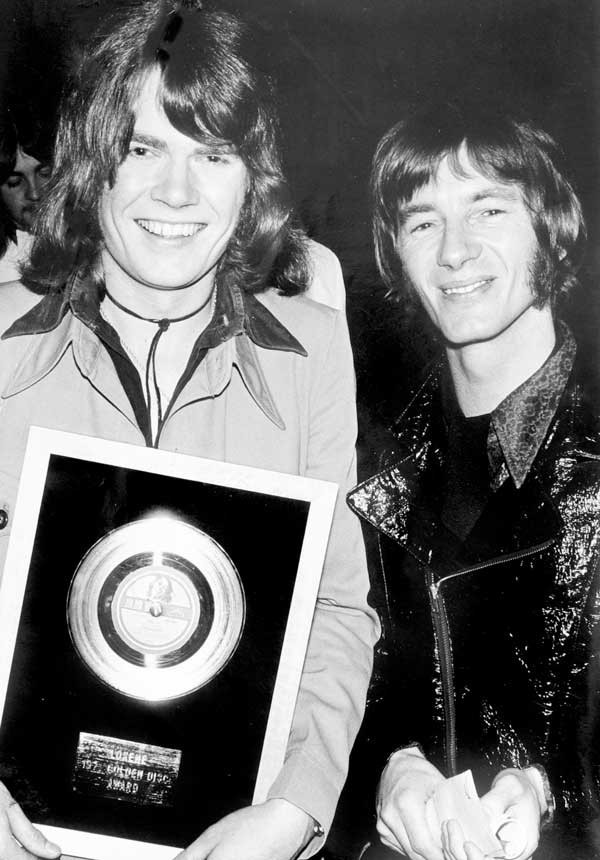
Craig Scott and Peter Dawkins, with the 1970 award. Peter Dawkins name appeared on the credits of more disc finalists than anyone else.
The finalists:
Craig Scott – ‘Let’s Get A Little Sentimental’ (HMV)
The Kal-Q-Lated Risk – ‘Angelina’ (HMV)
The Rumour – ‘Garden Of Your Smile’ (Philips)
Chapta – ‘Say A Prayer’ (HMV)
Ray Columbus – ‘People Are People’ (RCA)
Timberjack – ‘Come To The Sabbat’ (Ode)
Suzanne – ‘Stand By Your Man’ (Philips)
Farmyard – ‘Learning 'Bout Living’ (Philips)
The Hamilton County Bluegrass Band – ‘Hey Boys’ (RCA)
The Quincy Conserve – ‘Alright In The City’ (HMV)
Nash Chase – ‘Today I Killed A Man I Didn't Know’ (HMV)
Hogsnort Rupert – ‘Monday’ (HMV)
The criticism did not stop after the awards, with The Dominion running a long piece on the show which claimed “the format was old and tired … it looked like a hastily slung together collection of pop interludes with the only common theme holding them together being the boring set.”
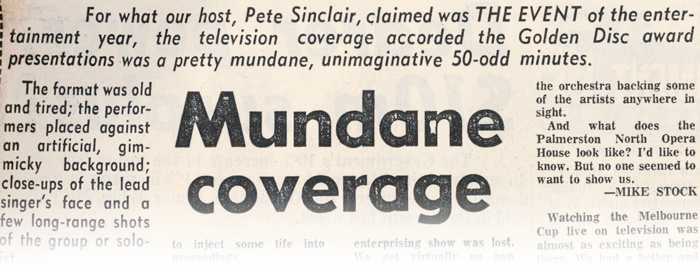
Despite this, the album of the show sold 45,000 copies, 50% up on the previous year but voting numbers were at a record low.
Roll on 1972.
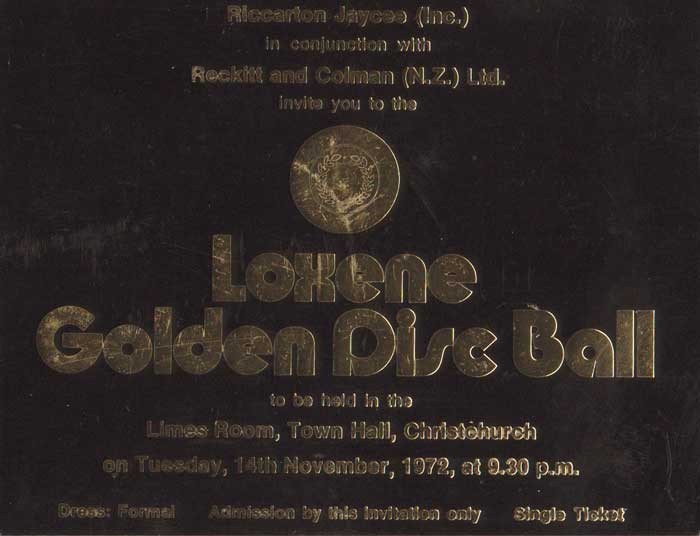
1972
Stung by the flak, immediately after the 1971 awards Loxene’s David Forsythe announced there were to be changes. Public voting was, he predicted, to be limited because of supposed block voting by record labels – the committee would meet early in the new year to improve the show and this they did.
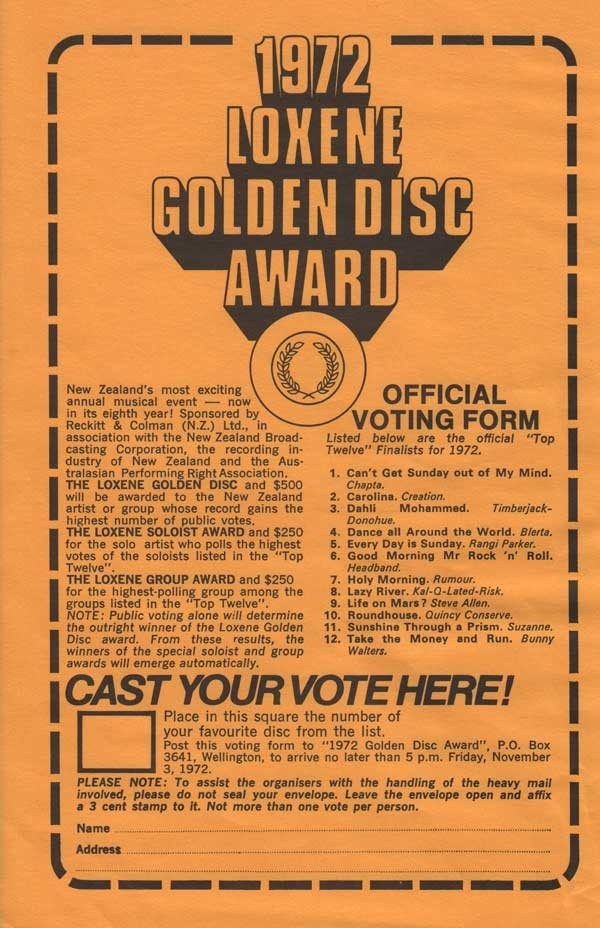
Initial discussions with the NZBC indicated that the show might be combined with Studio One to produce a “giant television pop awards scheme” but in the end Studio One was too valuable a property for the broadcaster and it drew huge audiences. As a result, the recording industry spent most of 1972 placing more emphasis on Studio One instead of its own Loxene-funded awards. HMV and PolyGram sold 55,000 copies of a joint Studio One album and signed several artists from the show. In the end, the voting system stayed the same.
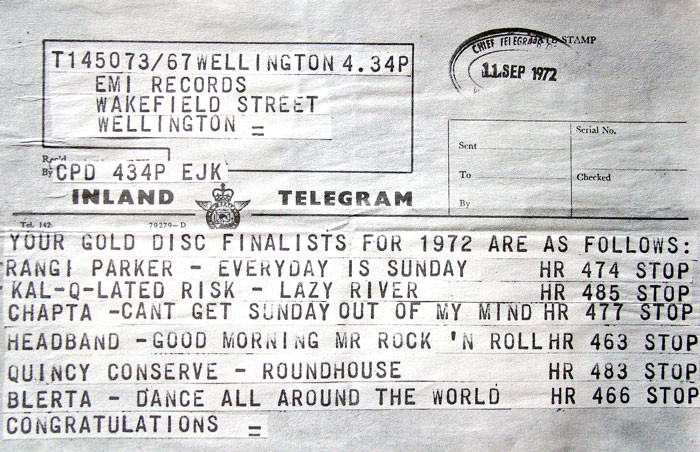
The telegram to EMI in September telling the company which of its singles were finalists in the 1972 awards - Grant Gillanders collection
The Christchurch Star predicted in August 1972 that the next year would see a “series of mid-winter hour long spectaculars combining all awards” but noted that TV’s strict sponsorship rules would cut Loxene out of the contest. It would, in other words, require NZBC funding, something they inevitably proved reluctant to supply.
In August Terence O’Neill-Joyce once again wrote to the organising committee, this time stating that Ode would “not be considering entry in the future” because of the demands for multiple singles and “16 B&W photos”. He also expressed strong reservations that the recording industry wasn’t getting the support from the NZBC across the year for locally produced records.
Amongst all this, and with a sense of impending finality, the 1972 Loxene Golden Disc was held in Christchurch Town Hall on 14 November. The winner, which split the industry somewhat (BLERTA were picked to win by many), was Wellington’s Creation with the massive hit, ‘Carolina’, issued on their manager Tom McDonald’s UBA label. They also picked up the group prize, with former Chick Suzanne (Lynch) winning the solo award for ‘Sunshine Through A Prism’.
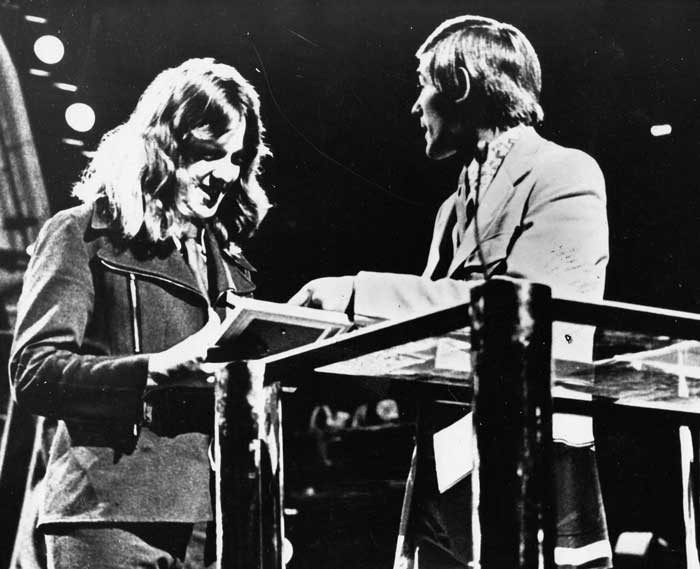
Creation's Greg Christensen receives the 1972 Loxene Golden Disc from MC Peter Sinclair in the Christchurch Town Hall. The final Golden Disc, their entry 'Carolina' was also the biggest selling New Zealand single of the year.
The final top 12 was (in order):
Creation – ‘Carolina’ (UBA)
Suzanne – ‘Sunshine Through A Prism’ (Philips)
Bunny Walters – ‘Take The Money And Run’ (Impact)
Rumour – ‘Holy Morning’ (Philips)
Chapta – ‘Can't Get Sunday Out Of My Mind’ (HMV)
Steve Allen – ‘Life On Mars?’ (Viking)
BLERTA – ‘Dance All Around The World’ (HMV)
Kal-Q-Lated Risk – ‘Lazy River’ (HMV)
Timberjack-Donahue – ‘Dahli Mohammed’ (Ode)
Headband – ‘Good Morning Mr Rock'n'Roll’ (HMV)
Quincy Conserve – ‘Roundhouse’ (HMV)
Rangi Parker – ‘Every Day Is Sunday’ (HMV)
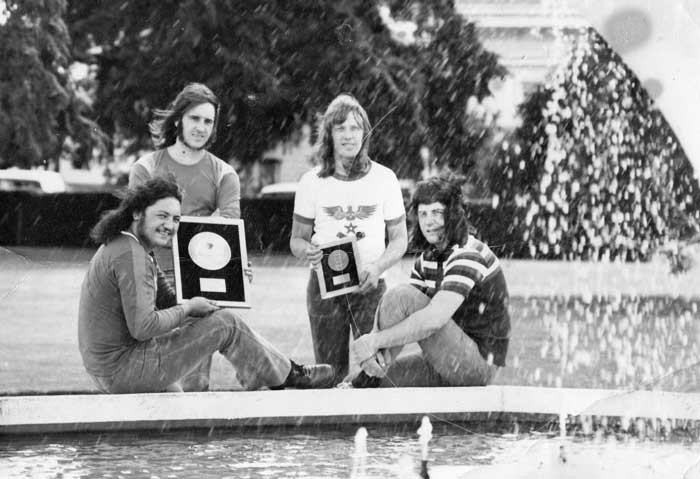
Creation with their 1972 awards for the Loxene Golden Disc and the top group - Greg Christensen collection
Just to add another nail, Brian Cowley in the next day’s Christchurch Star headlined his review “Golden Disc: Live show dead”.
However, the decision had already been made by the NZFPI during a confidential board meeting some two months earlier. The Loxene Golden Discs were dead. They had served their purpose and the industry needed to move onto an awards ceremony that captured the way albums had become dominant. It would, to quote Pye’s Tim Murdoch, provide “a contest for artists presenting locally written material”. The days had passed where “copying an overseas hit record down to the guitar twangs on the third bar” was acceptable. A committee (Phonogram’s John McCready, Tim Murdoch, Murdoch Riley from Viking and HMV’s Graham Feasey) was nominated to “begin work towards an annual award organised by the NZFPI”.
1973 would see the next step in the genesis of music awards and the beginnings of the New Zealand Music Awards as we know them now: The RATA Awards.
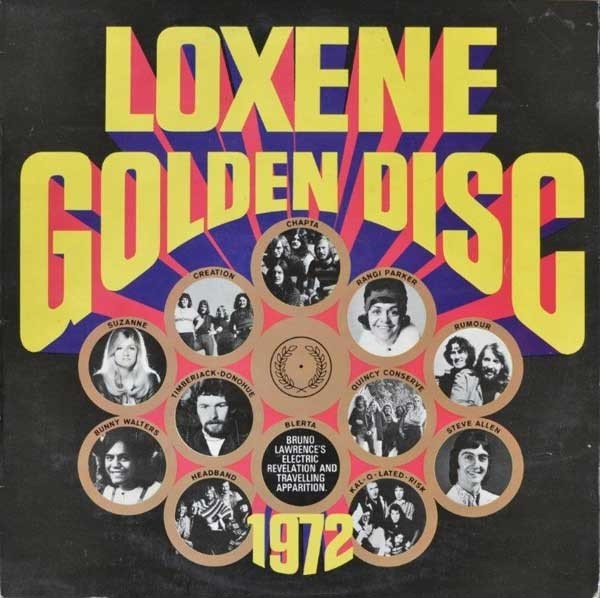
The final of three annual Loxene Golden Disc albums. Selling tens of thousands at the time, these were reissued by EMI in the early 2000s and sold well all over again.